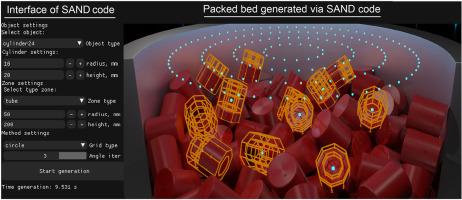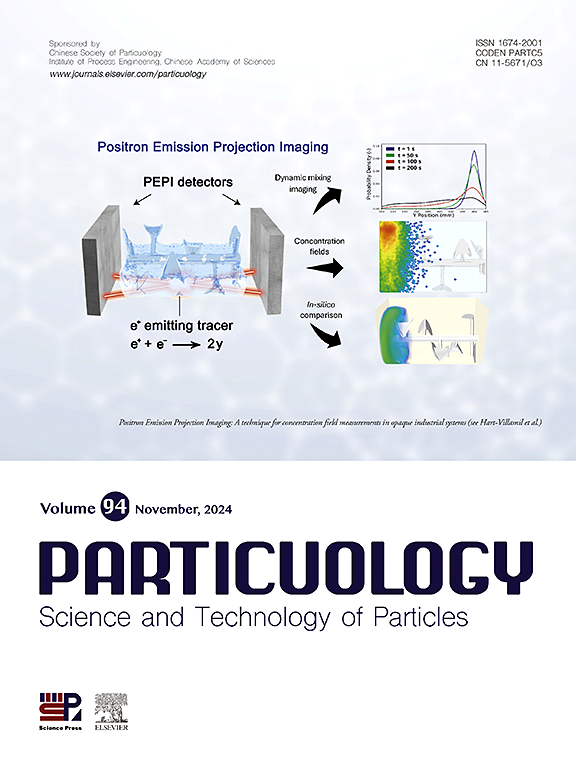A novel freemium code SAND (v1.0) for generation of randomly packed beds
IF 4.1
2区 材料科学
Q2 ENGINEERING, CHEMICAL
引用次数: 0
Abstract
The main current approaches for generation of the packed bed models are based on rigid body dynamics (RBD) and Newton's laws (discrete element methods - DEM). This paper deals with the development and analysis of a novel code based on analytical geometry approach for the packed bed generation. The architecture and main algorithms of the novel code are described and clarified. The parameters of the packed bed generated via the novel code are compared with experimental data and packed beds generated via Blender (RBD), Yade (DEM). The novel code demonstrates many advantages, such as good correlation with experimental data, no overlaps between pellets in the packed bed, and a low computational time for packed bed generation. The packed bed model can be directly exported in .step format. Other advantages are also demonstrated and clarified. The novel code is attached to this paper and can be freely used by engineers and scientists.

用于生成随机堆积床的新型免费代码 SAND (v1.0)
目前生成填料床模型的主要方法是基于刚体动力学(RBD)和牛顿定律(离散元素法 - DEM)。本文讨论了基于解析几何方法生成填料床的新型代码的开发和分析。本文描述并阐明了新型代码的结构和主要算法。通过新代码生成的填料床参数与实验数据以及通过 Blender (RBD)、Yade (DEM) 生成的填料床进行了比较。新型代码具有许多优点,例如与实验数据相关性好、填料床中颗粒之间无重叠、生成填料床的计算时间短。填料床模型可以直接以 .step 格式导出。此外,还展示并阐明了其他优点。本文附有新代码,可供工程师和科学家自由使用。
本文章由计算机程序翻译,如有差异,请以英文原文为准。
求助全文
约1分钟内获得全文
求助全文
来源期刊

Particuology
工程技术-材料科学:综合
CiteScore
6.70
自引率
2.90%
发文量
1730
审稿时长
32 days
期刊介绍:
The word ‘particuology’ was coined to parallel the discipline for the science and technology of particles.
Particuology is an interdisciplinary journal that publishes frontier research articles and critical reviews on the discovery, formulation and engineering of particulate materials, processes and systems. It especially welcomes contributions utilising advanced theoretical, modelling and measurement methods to enable the discovery and creation of new particulate materials, and the manufacturing of functional particulate-based products, such as sensors.
Papers are handled by Thematic Editors who oversee contributions from specific subject fields. These fields are classified into: Particle Synthesis and Modification; Particle Characterization and Measurement; Granular Systems and Bulk Solids Technology; Fluidization and Particle-Fluid Systems; Aerosols; and Applications of Particle Technology.
Key topics concerning the creation and processing of particulates include:
-Modelling and simulation of particle formation, collective behaviour of particles and systems for particle production over a broad spectrum of length scales
-Mining of experimental data for particle synthesis and surface properties to facilitate the creation of new materials and processes
-Particle design and preparation including controlled response and sensing functionalities in formation, delivery systems and biological systems, etc.
-Experimental and computational methods for visualization and analysis of particulate system.
These topics are broadly relevant to the production of materials, pharmaceuticals and food, and to the conversion of energy resources to fuels and protection of the environment.
 求助内容:
求助内容: 应助结果提醒方式:
应助结果提醒方式:


